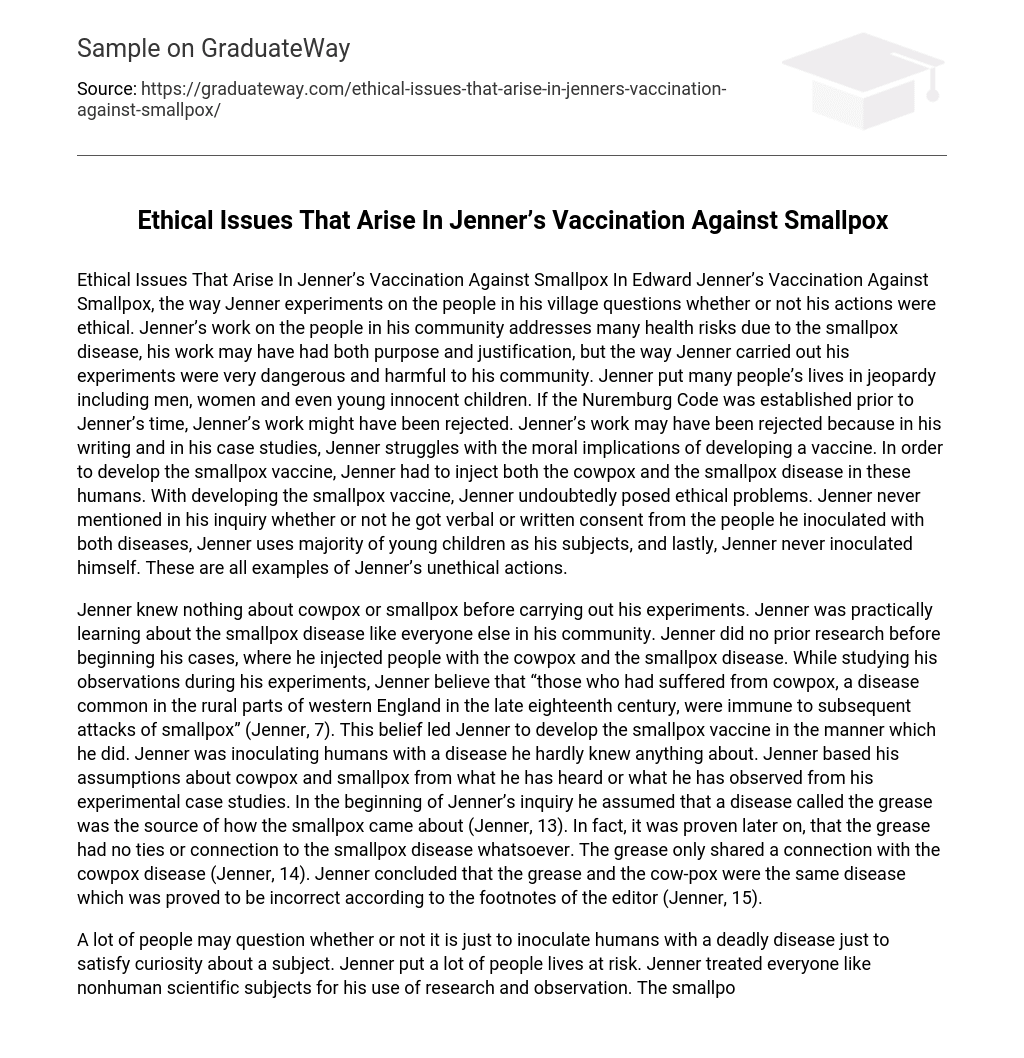The ethical implications of Edward Jenner’s Vaccination Against Smallpox are brought into question due to his experimentation on individuals within his own village. Despite Jenner’s objective of addressing the health risks associated with smallpox, the manner in which he conducted these experiments presented significant danger and harm to his community. Not only did Jenner endanger multiple lives, but he also put the well-being of men, women, and even young innocent children at risk.
If the Nuremburg Code had been in place prior to Jenner’s era, his work could have faced rejection on ethical grounds. Jenner extensively contemplated the moral consequences of developing a vaccine in his writings and case studies. His research involved injecting humans with both cowpox and smallpox diseases for the development of the smallpox vaccine, thereby raising ethical concerns.
Jenner’s inquiry did not mention if he obtained verbal or written consent from the individuals he inoculated with both diseases. Furthermore, Jenner predominantly chose young children as his subjects, and, notably, he never inoculated himself. These instances exemplify Jenner’s unethical behavior.
Jenner had no knowledge of cowpox or smallpox before conducting his experiments. Like others in his community, Jenner was in the process of learning about smallpox. Jenner did not conduct any research before starting his cases, in which he administered both cowpox and the smallpox disease to individuals. During his experiments, Jenner observed that those who had previously contracted cowpox, a prevalent disease in rural western England during the late eighteenth century, were immune to future smallpox infections (Jenner, 7).
This belief prompted Jenner to develop the smallpox vaccine using the methods he did. Jenner administered a disease to humans that he had limited knowledge about. He formed his assumptions regarding cowpox and smallpox from hearsay or observations made during his experimental studies. At the start of Jenner’s investigation, he theorized that a disease known as the grease was the cause of smallpox (Jenner, 13).
It was later proven that the grease had no connection to the smallpox disease. However, it was found to be associated with the cowpox disease. Jenner incorrectly concluded that the grease and cowpox were the same disease, as noted by the editor’s footnotes (Jenner, 14-15).
Many question the ethicality of intentionally infecting humans with a deadly disease purely for the sake of satisfying curiosity. Jenner’s actions endangered numerous lives, as he treated individuals as objects of scientific study for his own research and observation. The smallpox disease posed a potential risk of death. Jenner experimentally tested his hypothesis on healthy individuals, including an eight-year-old boy who received inoculations of both cowpox and then smallpox in order for Jenner to accurately observe the progression of the infection (Jenner, 24).
This boy was never afflicted with either diseases, yet Jenner still elected to vaccinate him, which was highly unethical. By administering both cowpox and smallpox, he put these healthy individuals at great risk. Nowhere in Jenner’s investigation does he mention obtaining verbal or written consent from the villagers. How can we be sure that Jenner even informed these people that he was injecting a deadly disease into them? Jenner used these healthy individuals to study the effects of cowpox symptoms on the body, followed by observing their reaction to smallpox inoculation.
What if these individuals had died after being injected with cowpox by Jenner? The inquiry into Jenner’s actions reveals a lack of concern for obtaining consent; all Jenner cared about was inoculating these individuals. It is unethical to introduce a deadly and highly contagious disease into people without their consent. Is it just or acceptable to use children as test subjects in order to examine Jenner’s study on cowpox and smallpox? By studying how Jenner conducted his experiments, it becomes evident that he primarily used children to demonstrate that cowpox could serve as a vaccine for smallpox. This aspect of Jenner’s studies was extremely distressing. In fact, Jenner conducted his initial experiment on an eight-year-old boy (Jenner, 7).
Despite the lack of sympathy Jenner showed towards innocent children, he paid no attention to their age. This is evident when he decided to inoculate a newborn baby (Jenner, 27) and also toddlers and children around the age of eight. In case 22, it was reported that matter from the arm of a girl was injected into a one year and a half old boy and an eleven months old boy (Jenner, 28). Injecting young innocent children with a deadly disease is considered unethical because they lack the capacity and intellectual awareness to consent to becoming medical subjects.
Children, including infants and toddlers, are unable to consume medicine at a young age and are unaware of the potential risks they face. Consequently, if the vaccine were to fail, their lives would be in grave danger. Instead of using young children as test subjects, Jenner should have initially conducted experiments on adults. It is worth considering why Jenner did not personally inject himself with both cowpox disease and smallpox to observe their effects. By keeping his self-experimentation undisclosed, Jenner demonstrates a certain level of doubt or skepticism.
Jenner acknowledged the potential hazards of injecting himself with either cowpox or smallpox diseases. Rather than endangering his own life, he opted to jeopardize the lives of others, a morally unethical act. Numerous medical experts condemned Jenner’s method as incorrect and morally reprehensible.
We must consider whether Jenner’s means are justified by his ends. Despite the effectiveness of Jenner’s smallpox vaccine being proven, it is not acceptable for him to put the lives of adults or vulnerable children at risk by injecting them with a dangerous disease. The fact that Jenner’s actions resulted in a benefit does not excuse his unethical conduct.





